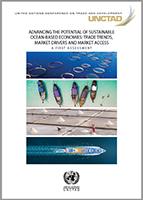Advancing the potential of sustainable ocean-based economies: trade trends, market drivers and market access

Over the past decades, the challenges facing the world have intensified at a speed that puts our oceans and the people and economies that rely on them in peril. Overfishing and chemical and plastic pollution have resulted in species extinctions, variations in the biomass levels of the oceans, and the degradation of ecosystems, leading to the loss of half of all living corals. In addition, the impact of climate change has led to a rise in sea levels, ocean temperatures, ocean acidification, de-oxygenation, shifts in fish distribution, decrease in fish stocks, coastal erosion and extreme weather events.
Oceans are home to 80 per cent of the world’s biota and their ecosystems have a higher diversity of living organisms than terrestrial ecosystems. The Sustainable Oceanbased Economies Classification (SOEC) prepared by UNCTAD identifies 100 clusters (from over 780 industries) of goods, services and energy industries that are dependent on the oceans.
Although all ocean-based industries are traded, little is known about these industries in the context of the blue economy, the size and trends of the trade flows, market access challenges and opportunities, or the supply side gap. Even less is known about the interplay between trade and the interconnectivity and complexity of the sectors. Their impact on oceans ecosystems is also largely unknown. Likewise, information on social issues such as vulnerable communities, or the prevalence of gender inequality, is also lacking for most ocean-based industries.
This report is a first step towards filling the knowledge gap about sustainable ocean economies. It provides a base for further research and analysis and sets qualitative and quantitative baselines for comparison and understanding. Using UNCTAD’s SOEC, the report examines trade data availability, describes the industries that are part of the classification, takes stock of export trends, analyses the market drivers of these industries, and evaluates market access through an analysis of tariff and non-tariff barriers to trade.
The report finds that at the global level, trade data are available for only 61 of 100 ocean-based industry clusters. Filling this data gap will be crucial to better identify and address the challenges and opportunities of the oceans economy.
At the country level, in most subsectors, an increasing number of countries are trading less traditional industries such as seafood processed by-products, sport boats, cosmetics, etc. The level of disaggregation and information about market drivers also reveal that leading countries are venturing into new products and developing value chains.
The COVID-19 pandemic has shown the fragility of the global economy, revealed the critical role of product and market diversification, and the importance of sustainability.
This report considers that there will be an uneven downwards trend and significant uncertainty in most oceans economy sectors because of the COVID-19 pandemic and its impact on exports, but it does not attempt calculations or analysis beyond 2018 because its purpose is to provide a quantitative baseline and an initial sectoral overview. Also, many of the impacts of COVID-19 may not yet be fully captured by international datasets because of lags in reporting.
Finally, the report identifies regional and international cooperation as essential to fill data gaps, democratize access to and development of technologies, and promote regulatory harmonization and transparency. These, together with advocacy and building national capacities, are critical to cope with the challenge of a sustainable oceans economy.


